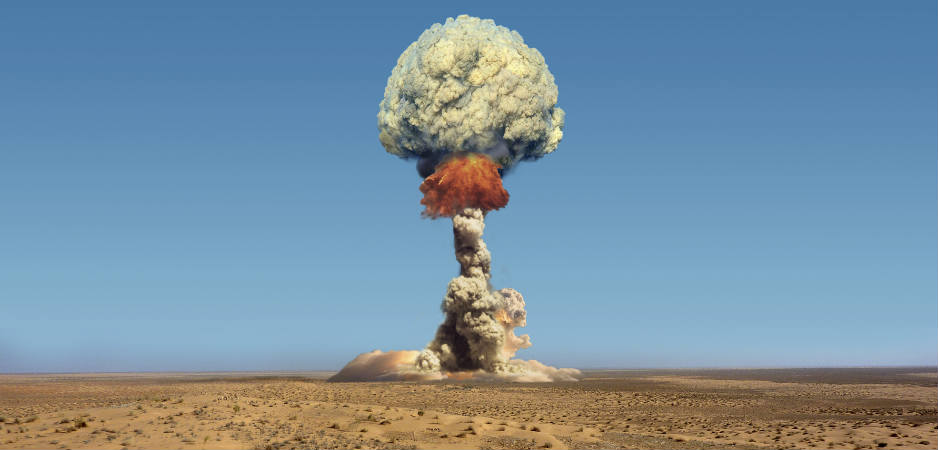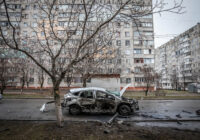A world without nuclear weapons seems as far removed now as during the 1980s.
In 2000, Bill Clinton and Vladimir Putin signed a deal calling on both countries to reduce their stockpiles of weapons-grade plutonium. The deal, called the Plutonium Management and Disposition Agreement (PMDA), was the hallmark of an era when both countries were committed to healing the deep wounds left by the Cold War.
Earlier this month, following two years of conflict and disagreements that shook US-Russia relations, Putin suspended the 16-year-old deal with America. In a statement on October 3, President Putin said the decision stemmed from “the emergence of a threat to strategic stability and as a result of unfriendly actions by the United States of America towards the Russian Federation”—a reference to the uproar caused by Russia’s continued bombing of civilians in Aleppo.
Ostensibly, the reason the PMDA was scuttled is because President Barack Obama recently proposed changing the method that was used to render plutonium unusable. Instead of irradiating the plutonium and transforming it into mixed-oxide (MOX) in a special facility that is currently under construction in South Carolina, the administration switched to something called “immobilization” by which the material is mixed with radioactive waste that renders it unusable in bombs.
Different Era
The PMDA, which was renewed in 2009 when Hillary Clinton served as US secretary of state, was the product of a very different era of diplomacy between the two countries. Today, against the backdrop of two proxy wars in Ukraine and Syria, Putin is manufacturing technical explanations to fault the United States for not living up to its end of the deal. And while Ukraine has simmered down in recent months, and is more and more resembling one of the many frozen conflicts found on the Russian periphery, the war in Syria has brought bilateral relations to arguably their lowest point since the Cold War.
The breakdown in relations is especially frightening in terms of the downturn in nuclear cooperation. Efforts such as the Strategic Arms Reduction Treaty were essential to disarmament after the collapse of the Soviet Union. US-Russia cooperation enabled the blending down of 500 tons of enriched uranium from Soviet nuclear weapons, which were then purchased by the US for use as reactor fuel. Some 900 missiles were destroyed and 7,600 warheads were deactivated. Weapons scientists were placed in stable jobs with salaries generous enough to discourage the sharing of their knowledge with rogue states or terrorists. While this entente ensured a reduction of risks after the Cold War and was an unabashed success for more than a decade, the architecture starting crashing down in the early 2010s.
Suspicious of American nuclear inspectors, Russia decided to depart from practically all bilateral nuclear security cooperation mechanisms, even refusing to participate in this year’s biennial Nuclear Security Summit. This was a turning point in relations, especially since both sides had agreed to always cooperate in matters of counterterrorism and nonproliferation, which were long seen as issues of the utmost importance.
Even if Moscow and Washington held throughout the past two decades different views over the nuclear programs in Tehran, Pyongyang or Tel Aviv, they were still dedicated to working together. And now, by pulling out of the 2000 PSMA, Putin is essentially conflating actions he perceived as hostile in Syria and Ukraine, with grievances regarding the US handling of its own side of the plutonium deal.
Decline in Cooperation
The decline in cooperation between Russia and the West comes with serious consequences in the civilian sector as well. Projects undertaken by Russian state-owned atomic energy company Rosatom have been accused of questionable safety practices. Nuclear power plants such as the Ostrovets reactor in Belarus may live up to local safety standards, but not to those of the neighboring European Union member states such as Lithuania. Ostrovets, which is just a one hour drive from Lithuanian capital Vilnius, has seen a number of dangerous accidents, including a dropped reactor shell and an explosion of an oxygen gas tank, which killed a worker.
The fact that Belarus is using a new, untested reactor and has repeatedly stonewalled European demands for nuclear inspections is not reassuring either. Similarly, Rosatom is also building a reactor in southern Turkey, at Akkuyu, and this project has also been criticized for bad planning and a lack of independent oversight.
 Fair Observer provides you deep and diverse insights for free. Remember that we still have to pay for servers, website maintenance and much more. So, donate now to keep us free, fair and independent.
Fair Observer provides you deep and diverse insights for free. Remember that we still have to pay for servers, website maintenance and much more. So, donate now to keep us free, fair and independent.
Getting the two powers to talk to each other will not be an easy feat, especially after leaders such as US Secretary of State John Kerry and French President Francois Hollande have called on Russia to be brought before an international tribunal for war crimes.
And Moscow isn’t backing down either. In the same press release that announced the termination of the PMDA, the Kremlin put forward a laundry list of demands for its resumption of nuclear cooperation. Russia is demanding a rollback of sanctions, compensation for economic damage incurred, reductions of US military presence in certain areas, and the repeal of the Magnitsky Act. This act, instituted in 2012, allows Americans to freeze the assets of Russian officials suspected of involvement in human rights violations.
These events all cast a shadow over President Obama’s initiative to rid the world of nuclear weapons, announced just months after he took office. Since then, his own administration has indicated that $1 trillion would be spent over the next decades, not on eradicating nuclear weapons, but on modernizing the US arsenal. The issue of following through on this vision of a nuclear-free world has scarcely been mentioned in the current presidential campaign, and is difficult to even imagine after years of continued tensions with North Korea, violent instability in the Middle East and the diplomatic conflicts with Russia.
The significance of the breakdown in nuclear cooperation cannot be overstated. These bilateral security agreements were one of the great successes of the end of the Cold War. Now, the ideal of a world without nuclear weapons seems as far removed as during the 1980s.
The views expressed in this article are the author’s own and do not necessarily reflect Fair Observer’s editorial policy.
Photo Credit: CUTWORLD
Support Fair Observer
We rely on your support for our independence, diversity and quality.
For more than 10 years, Fair Observer has been free, fair and independent. No billionaire owns us, no advertisers control us. We are a reader-supported nonprofit. Unlike many other publications, we keep our content free for readers regardless of where they live or whether they can afford to pay. We have no paywalls and no ads.
In the post-truth era of fake news, echo chambers and filter bubbles, we publish a plurality of perspectives from around the world. Anyone can publish with us, but everyone goes through a rigorous editorial process. So, you get fact-checked, well-reasoned content instead of noise.
We publish 2,500+ voices from 90+ countries. We also conduct education and training programs
on subjects ranging from digital media and journalism to writing and critical thinking. This
doesn’t come cheap. Servers, editors, trainers and web developers cost
money.
Please consider supporting us on a regular basis as a recurring donor or a
sustaining member.
Will you support FO’s journalism?
We rely on your support for our independence, diversity and quality.






